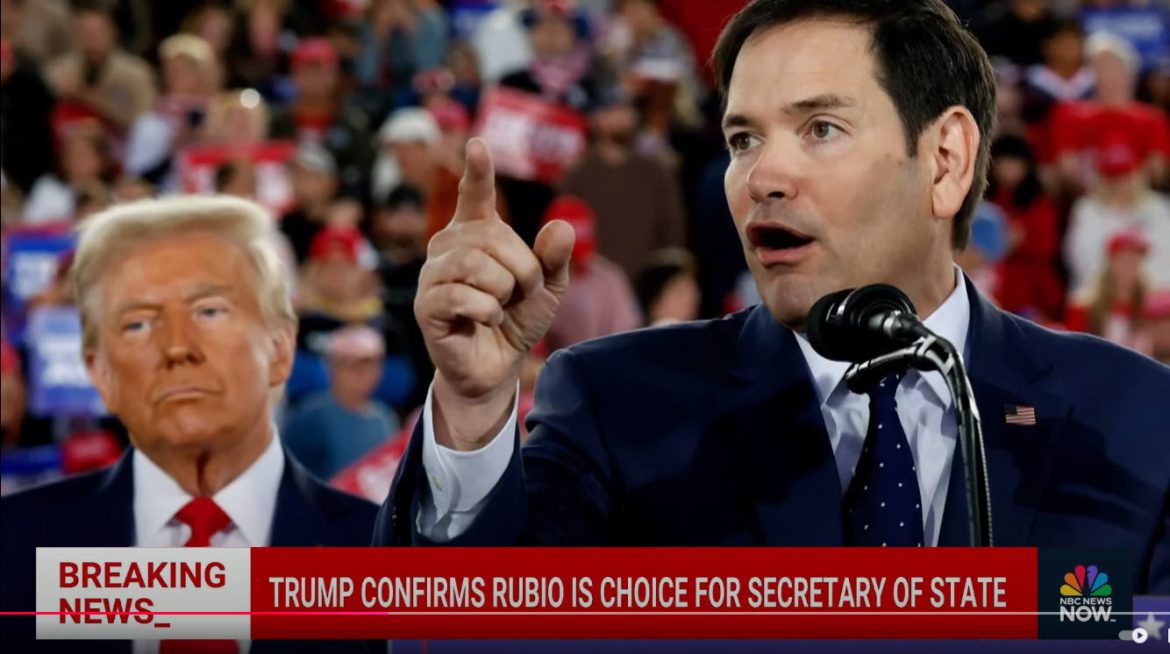President-elect Donald Trump has officially nominated Senator Marco Rubio, R-Fla., as his choice for Secretary of State, signaling a strategic decision aimed at reinforcing a firm stance on international relations. The announcement comes after weeks of speculation, as Trump’s administration takes shape with key positions. Rubio, a vocal advocate for a robust U.S. presence on the global stage, is expected to bring an assertive foreign policy perspective to Trump’s Cabinet.
Trump introduced Rubio as his choice at a press conference, highlighting the senator’s commitment to American ideals and his dedication to protecting U.S. interests abroad. “Senator Rubio has been a champion of American strength and values,” Trump stated. “His experience in foreign policy and his dedication to freedom will be instrumental as we work to defend our nation’s interests globally.” The President-elect praised Rubio’s extensive background on the Senate Foreign Relations Committee, where Rubio has worked on critical issues, including human rights, democracy promotion, and national security.
Rubio, who has represented Florida in the Senate since 2011, has cultivated a strong foreign policy portfolio and has consistently pushed for a harder line against authoritarian regimes, especially in Latin America and the Middle East. Known for his critical stance toward governments in China, Iran, and Venezuela, Rubio’s nomination is widely viewed as a signal that Trump’s administration plans to approach U.S. foreign policy with a hardline approach, prioritizing national security and assertive diplomacy.
In his acceptance speech, Rubio expressed gratitude to Trump and underscored his commitment to “protecting American interests, promoting democracy, and standing up to adversaries.” He pledged to advocate for policies that keep the U.S. strong on the international stage, focusing on maintaining alliances while taking a firm stance against those who threaten American security. “It is an honor to serve our country in this capacity, and I am dedicated to upholding America’s values and leadership worldwide,” Rubio said. He also acknowledged the challenges ahead, emphasizing that “the world faces unprecedented threats, and we must be prepared to confront them with resolve and clarity.”
Rubio’s nomination has garnered praise from Republicans, who view him as a seasoned voice with a clear understanding of America’s foreign policy challenges. Senator Lindsey Graham, R-S.C., one of Rubio’s allies, praised the choice, stating that “Marco brings strength, conviction, and a deep understanding of what it means to lead on the global stage.” Graham added that Rubio’s experience and perspectives would help restore America’s leadership in defending human rights and democratic principles.
However, Rubio’s nomination is expected to face rigorous scrutiny in the Senate, especially from Democrats concerned about his stances on certain issues. Rubio has long been an advocate for a hawkish approach toward China and has called for greater U.S. support for Taiwan, which could affect U.S.-China relations. Additionally, his strong opposition to the nuclear deal with Iran could signal a shift in policy toward a more confrontational stance with Tehran. While his views align with Trump’s vision of an “America First” foreign policy, some lawmakers worry that Rubio’s assertive approach may create diplomatic challenges with key allies.
International responses to Rubio’s nomination have also varied. European allies, who view U.S. engagement in multilateral organizations as crucial to global stability, hope that Rubio’s background will translate into continued U.S. commitment to NATO and other alliances. Analysts suggest that Rubio’s approach to transatlantic relations will be closely watched, particularly as Europe grapples with security concerns involving Russia and ongoing instability in the Middle East.
Rubio’s nomination comes as the U.S. faces complex foreign policy challenges, from competition with China and Russia to concerns over cyber threats and regional conflicts. Rubio has previously voiced support for increased defense spending and closer security alliances with democratic nations, aligning his vision with Trump’s focus on strengthening national defense. His appointment also suggests that the Trump administration will prioritize strengthening ties with countries like Israel, whose Prime Minister Benjamin Netanyahu has commended Rubio’s longstanding support.
While Rubio prepares for his confirmation hearing, he faces the task of outlining his foreign policy agenda amid a divided Senate. Lawmakers from both parties are expected to question him on his plans for handling relations with China, addressing ongoing conflicts in the Middle East, and his views on emerging threats such as cybersecurity and climate change. Some Democrats are likely to question Rubio’s stance on climate policy as it relates to international agreements, as well as his approach to managing global humanitarian crises.
As Rubio steps into this critical role, his nomination underscores the Trump administration’s commitment to a strong, proactive foreign policy that emphasizes security, human rights, and support for democratic allies. Rubio’s tenure as Secretary of State, if confirmed, will set the tone for America’s role on the world stage, positioning the U.S. to face a range of challenges with renewed focus and resolve.



